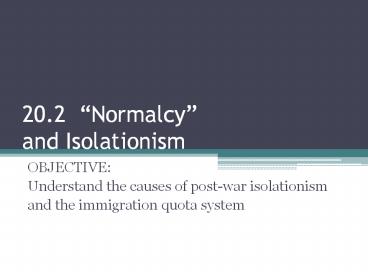20.2 PowerPoint PPT Presentation
1 / 13
Title: 20.2
1
20.2 Normalcy and Isolationism
- OBJECTIVE
- Understand the causes of post-war isolationism
- and the immigration quota system
2
The Return to Normalcy
- ELECTION OF 1920
- Warren G. Harding and Calvin Coolidge (REP)
- Vs.
- James M. Cox and Franklin D. Roosevelt (DEM)
- OUTCOME
- REPUBLICANS WIN BY WIDE MARGIN. WHY? Harding
pledges normalcy again.
3
PRESIDENT HARDING
- America's present need is not heroics, but
healing not nostrums, but normalcy not
revolution, but restoration not agitation, but
adjustment not surgery, but serenity not the
dramatic, but the dispassionate not experiment,
but equipoise not submergence in
internationality, but sustainment in triumphant
nationality...."
http//www.whitehouse.gov/history/presidents/wh29.
html
4
Kellogg-Briand Pact
- 1921 US invites nations to freeze naval
construction and begin disarmament. - 1929 64 nations had signed the Kellogg-Briand
Pact, renouncing war as an instrument of
diplomacy. - This is an example of America promoting
isolationism - PROBLEM The pact was voluntary and not
enforceable.
5
TARIFFS AND REPARATIONS
OUTCOME Bad feelings all around. Unstable
economic house of cards.
6
IMMIGRATION QUOTAS
- US experience a wave of racism, lynchings, and
nativism after WWI. - Immigration booms after WWI
- Quota System enacted in 1921 to slow the flow
- Quotas discriminate against Southern and Eastern
Europeans, Roman Catholics and Jews - AND excludes Japanese. http//www.phschool.com/cu
rriculum_support/taks/images/PWU4ques10-11.jpg
7
PROBLEMS WITH PROHIBITION
- 1920 18th Amendment comes into effect with
Volstead Act - Saloons and bars close, but demand does not go
away - Government does not fund enforcement
- People make alcohol at home in stills or go to
speakeasies. - Bootleggers and mob bosses like Al Capone make
millions.
8
EFFECTS OF PROHIBITION
- Black market for booze booms
- Smugglers bring in alcohol from Cuba, Canada and
the West Indies - Police and judges become corrupt from accepting
bribes - Cities become violent as mafia and gangs fight
for booze market - RESULT By mid-1920s, only 19 of US supports
Prohibition. YET, not repealed until 21st
Amendment in 1933.
9
American Fundamentalism
- Movement founded in literal interpretation of the
Bible - Skeptical of scientific knowledge
- Rejected Darwinism
10
The Scopes TrialAKA the Monkey Trial
- 1925 Fundamentalists win battle to make teaching
of evolution illegal in Tennessee - John Scopes, Biology teacher, arrested
- ACLU hires Clarence Darrow as defense
- William Jennings Bryan is special prosecutor
- Nationwide audience (trial is outside b/c of
crowds) - Darrow puts Bryan on trial
- Scopes found guilty, pays 100 fine
- IMPACT SHOWS GROWING CULTURAL DIVIDE
- IS THIS AN ISSUE TODAY???
11
Twenties Women
- Flapper emancipated young women
- who embraced new fashions
- Women began to act differently,
- became more assertive, wanted equality with men
- Began to play sports, viewed marriage as an equal
partnership - Dating became more popular, but a double standard
still existed. - This is set of principles granting greater sexual
freedom to men - Women were expected to observe stricter standards
of behavior than men
12
Harlem Renaissance
- Great Migration caused many AAs to move North,
racial tensions increased - NAACP urged blacks to fight against racial
violence - James Weldon Johnson helped lead the fight,
introducing three anti-lynching bills to Congress - Universal Negro Improvement Association black
nationalist group, believed that AAs should form
their own, separate societies.
13
Harlem Renaissance
- Overcrowding, unemployment and poverty existed in
urban neighborhoods such as Harlem - But a flowering of AA creativity called the
Harlem Renaissance, a literary and artistic
movement celebrating AA culture eclipsed the
problems

